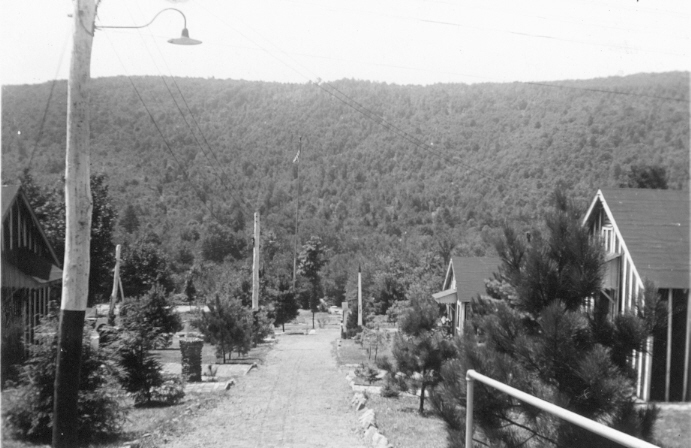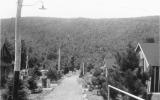CPS Unit Number 016-01
Camp: 16
Unit ID: 1
Operating agency: BSC
Opened: 7 1941
Closed: 11 1944
Workers
Total number of workers who worked in this camp: 512
-
 CPS Camp # 16, Kane, Pennsylvania"Main St." Camp Kane.Digital Image © 2011 Brethren Historical Library and Archives. All Rights Reserved.
CPS Camp # 16, Kane, Pennsylvania"Main St." Camp Kane.Digital Image © 2011 Brethren Historical Library and Archives. All Rights Reserved.
CPS Camp No. 16, a Forest Service base camp located in Kane, Pennsylvania and operated by the Brethren Service Committee, opened in July 1941 and closed in November 1944. Assignees fought fires, conducted fire prevention duties, and prepared for fire control.
CPS Camp No. 16, a Forest Service base camp, was located in Kane, Pennsylvania near the Allegheny National Forest and operated by the Brethren Service Committee.
Kane was the first Brethren camp established in Pennsylvania. A second camp, CPS No. 48 at Marienville, an offshoot from Kane, drew its personnel from Kane. After Marienville closed in September 1942, camp personnel returned to Kane.
Directors: Levi Ziegler, Q. A. Holsopple, Vernon Nichols
The men in most Brethren camps tended to report, upon entry into CPS, a mix of Church of the Brethren affiliation with other denominational affiliations.
Some African American men served at Kane.
Some men on parole served at the camp.
Men at Brethren camps on average had completed 12.22 years of education when entering CPS, with thirty-nine percent having completed one-three years of college, graduated, or completed some graduate work. Twelve percent of men in Brethren camps reported their occupation when entering CPS as students; twenty nine percent as farmers or other agricultural workers; eighteen percent as technical or professional work; sixteen percent as business management, sales and public administration; twenty one percent as skilled and semi-skilled trades; and four percent as factory and other work. (Sibley and Jacob pp. 171-72)
Assignees fought fires. In cases of large fires, they worked from emergency camps set up immediately adjacent to the burn where they ate and slept in bed rolls when possible.
The men worked on preventive or preparatory duties for fire control. Some were instructed in the maintenance of two-way radio sets, telephone repair, repair and cleaning of tools and equipment. Others served in remote side camps as fire crews on alert. Men also built and maintained forest lookout systems.
The diversity of the COs at Kane created opportunities to learn from fellow campers and their experiences. The men held different views about government, religion, social and economic issues, so that both the formal and informal educational programs encouraged growth in social awareness and increased sensitivity to the views of others.
One Brethren CPS educational publication cited Kane as a camp providing examples of informal opportunities for growth in social awareness and increased understanding of social and economic issues.
There was a ripple of excitement when we first received Negro enrollees. But the fact that these Negroes have won their way into the hearts of all is worth more than hours and hours of formal discussion and bull sessions about how to overcome the evils of race discrimination.
Similarly with the presence of parolees in the camp. In this case there were different convictions from the rank and file of the camp; had different views about government, religion and the like. Living together has been of great educational value. (Bulletin on Non-Formal Education from May 25, 1943 in Eisan p. 162)
Don Snider, Brethren Service representative for one hundred twenty churches in southern, central and western Pennsylvania, solicited food for the forestry camps at Kane and Marienville.
Across the brotherhood, church groups raised, collected, and canned tons of food—meats, vegetables, fruits—which were distributed to the camps. Many churches were supportive, but a few resisted the Brethren Service program and would not allow it to be presented to the congregation. Snider had lengthy conversations with his second cousin, Harold Snider, pastor of the Lewiston, Pennsylvania church, who did not agree with the denomination’s peace position. Although a Brethren pastor, Harold Snider was not a pacifist and was harshly critical of those who opted for alternative service. After intense pressure from Don to promote congregational donations to support the men at Kane, the pastor personally donated two pounds of sugar and a can of beans. This token gift, which was likely an attempt to keep Don from sensitizing or soliciting contributions from the congregation, illustrates the lack of church unity on the issue of alternative service. (Kreider pp. 16-17)
Men at Kane, as at other CPS camps, received an allowance of $2.50 per month at that time.
The men published a camp newspaper The Kane Penn from March 1942 through September 1943. In addition, records show a second publication, Raising Kane published April through July of 1944.
For more information on Brethren forest service projects and base camp life, see Leslie Eisan, Pathways of Peace: A History of the Civilian Public Service Program Administered by the Brethren Service Committee. Elgin, IL: Brethren Publishing House, 1948, pp. 74-84; 112-187.
For stories from men who, as COs, walked to a different drummer during World War II, see Mary R. Hopkins, Editor, Men of Peace: World War II Conscientious Objectors. Caye Caulker, Belize: Producciones de le Hamaca, 2010, Charles F. Cooley, pp. 111-122.
See also J. Kenneth Kreider, A Cup of Cold Water: The Story of Brethren Service. Elgin, IL: Brethren Press, 2001.
See also Mulford Q. Sibley and Philip E. Jacob, Conscription of Conscience: The American State and the Conscientious Objector, 1940-1947. Ithaca, NY: Cornell University Press, 1952.
Swarthmore College Peace Collection, Camp periodicals database.
